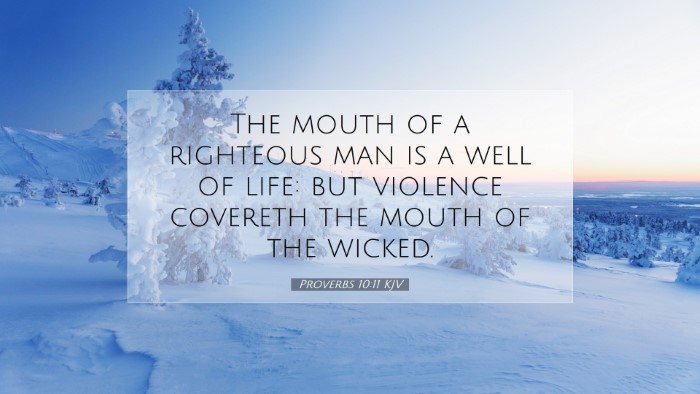Commentary on Proverbs 10:11
Verse Context: Proverbs 10:11 states, "The mouth of a righteous man is a well of life: but violence covereth the mouth of the wicked." This verse contrasts the speech of the righteous and the wicked, emphasizing the moral implications of what is spoken.
Introduction
This proverb succinctly encapsulates the essence of speech as a reflection of character and moral standing. The righteous, through their words, foster life, health, and spiritual well-being in others, while the wicked's words spring forth from a source of violence, leaving destruction in their wake. The insights from various commentators illuminate the depth and implications of this verse.
Insights from Public Domain Commentaries
Matthew Henry's Commentary
Matthew Henry emphasizes that the mouth of a righteous person serves as a well of life. He draws an analogy to a spring of water that provides sustenance and refreshment. Righteous speech brings wisdom, encourages virtue, and fosters a spirit of life around it. Henry explains:
- Life-Giving Speech: The righteous person speaks words that encourage, uplift, and guide others. Their conversations reflect wisdom and offer life, not only spiritually but also in practical daily interactions.
- Contrast with the Wicked: The contrast with the wicked reveals a stark reality; their words arise from a heart infected with violence, which indicates a propensity to harm and destruct rather than nurture. The “mouth” as a metaphor signifies the source of one’s speech, illustrating that attitudes of the heart dictate the words that emerge.
Albert Barnes' Notes
Albert Barnes provides a detailed exploration of the significance of the terms used in the verse. He notes that the 'mouth of the righteous' symbolizes not only righteous speech but also reflects the character of the individual:
- Moral Character: Barnes ties the 'righteous' to integrity and morality, suggesting that the words spoken by such individuals resonate with the principles of truth and justice.
- Well of Life: The 'well of life' is not a stagnant pool; it is dynamic and flows forth, illustrating how the righteous continually provide life-giving words, much like refreshing water quenches thirst.
Adam Clarke's Commentary
Adam Clarke expands on the imagery surrounding the concept of a "well" and the spiritual implications of speech:
- Life and Vitality: Clarke argues that the implication of 'life' includes a broader understanding of both spiritual and physical vitality. Words can strengthen the soul, provide encouragement, and foster community.
- Destructive Nature of the Wicked: Clarke notes that the words of the wicked are marked by violence and increasing chaos, revealing their deeper moral decay. This violence represents not just physical acts but also destructive words that may manifest in gossip, slander, or deceit.
Theological Implications
The contrast depicted in Proverbs 10:11 between the speech of the righteous and the wicked carries significant theological weight:
- Reflection of Divine Character: The righteous reflect the character of God through their speech, echoing divine principles of love, justice, and mercy.
- Accountability for Speech: This passage provides a framework for understanding the moral accountability of believers regarding their words. It underscores the importance of cultivating a heart aligned with God to ensure that the overflow of speech is life-giving.
- Impact on Community: The distinctions made in this verse shed light on the power of words to influence communities and cultures. Thus, believers are encouraged to be aware of their language as it has the potential to either edify or tear down.
Applications for Life and Ministry
For pastors, students, theologians, and Bible scholars, the teachings of Proverbs 10:11 serve as practical exhortations:
- Encourage Life-Giving Conversations: In ministry settings, believers are challenged to practice and promote dialogue that fosters life. This could involve encouraging others through affirmations and wise counsel.
- Guarding the Heart and Speech: A continual examination of one's heart will often reveal the fountain from which one's words flow. Ministers, especially, must pursue a lifestyle of righteousness to ensure their speech is aligned with God’s will.
- Combating Destructive Speech: There’s an urgent need to address and rebuke negative or violent speech in community contexts. Teaching about the power of words is crucial in discipleship and teaching others how to communicate effectively.
Conclusion
Proverbs 10:11 encapsulates profound truths about speech and its moral implications. By examining the insights from various public domain commentaries, we recognize that the righteous speak from a source of life, while the wicked's words bring destruction. The challenge before us, as we reflect on this verse, is to ensure that our speech uplifts and nourishes, ultimately reflecting the heart of God in a world desperately in need of life.


